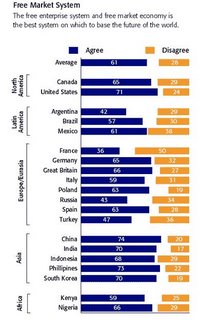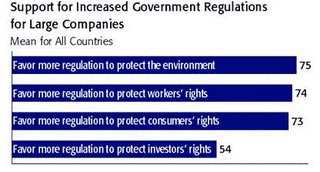 Globsescan has a report about how people in the various parts of the world think whether a free market economy is the best or not. This is particularly useful in view of the recent protests in France.
Globsescan has a report about how people in the various parts of the world think whether a free market economy is the best or not. This is particularly useful in view of the recent protests in France.Interestingly, the results seem to be a bit lopsided. One would think that traditional so-called "free-market economies" such as Europe, America, etc. would have popular opinions biased in favour of the free market approach, whereas traditional "closed economies" such as China and India would not favour it. But as the graphs show, that is not the case !
We see that in France, the majority do not favour the free-market idea ! And surprisingly, India and China and are front-runners among nations that support it ! Of course the United States is there as well.
While most other European nations (Turkey apart, again suprisingly) also support a free economy and free markets, the difference between the two factions is not very large (60-40 on an average). One would have expected a large majority of people to overwhelmingly support it among the more "developed" nations.
Also, the large support for this idea among India (70%) and China (the leader at 74%) is interesting. Both have had some closed form of econony or the other for a long period of time and still have their economies until tight control, while trying to open up slowly.
My thoughts on this are that perhaps the current "free economies" have tried various methods to achieve free economies but have maybe learnt the difficult way that it doesn't serve their purpose, at least in a short time frame. Perhaps what is required is a long-term approach to the idea...and when I say long term, I mean even a handful of decades is short-term ! But then again, politics being what it is, such an approach may not be altogether possible, because politicans are susceptible to the vagaries of their vote banks and even if a small section of the voters are hurt by a free economy, even for a short term, they are not averse to quickly reigning it in with countermeasures. This will not help the cause for free markets anywhere!
Also, India and China have a large number of nouveau-riche who with the more open societies and quick money made from the hot new techology sectors would really love the markets to open up, if not for anything else, but for the abundance of choices that will be available, so that they can spread some of their riches to attain a more aflluent lifestyle. They have known the weariness of closed economies and the government control of markets that come with it and the sad customer service obtained in the bargain and are probably edgy enough to try and drive the markets to open up. Interestingly, the study above only sample the urban markets...would they have gotten a different response had they tried to take a peek at the vast majority of people who stay in rural areas ? Perhaps...rural people and markets tend to be more socialistic and protectionist than urban markets...people tend to believe that with more choices, their own industries might get wiped out...altogether not a false assumption. But I think that if these folks figure out the concept of quality and better service, they can probably provide intense competition to any global threats, simple with local products are very good and can probably be cheaply manufactured and costs kept low, simply because they are local ! So, after the initial shakeup, the really smart entreprenuers will find a way to come up and provide smart, localised services.
So, the idea is, in a globalised world, one should be able to find that local niche that enables you to build up a business and perhaps consolidation also works...the classic example, is probably Verghese Kurien's "Operation flood" idea, which opened up the entire country to a few villages in Gujarat, simply by consolidating all the local small-scale milk industries of the state !

On a tangent, the above results also included thoughts on whether large companies should be regulated by the government (see second figure). The results, again suprising, considering that the average majority agreed on the free-trade idea, show that most people like the idea of regulation of large companies by the governments ! But as I mentioned, it is a tangent...nothing really to do with economics...perhaps more to do with ethics and a social life...people being vary of large entities that have just money as a credo and a bottomline.
Original link (to the figures) via Sepia Mutiny.
No comments:
Post a Comment